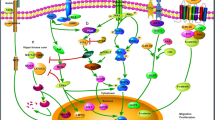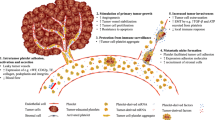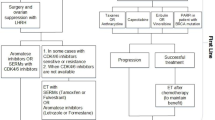Abstract
Background
This study aimed to establish an effective and practical prognostic index for esophageal squamous cell cancer (ESCC) based on the coagulation factors.
Methods
The training cohort of 965 patients with ESCC was retrospectively collected at Sichuan Cancer Hospital from 2012 to 2014, along with clinical characteristics and follow-up information. Risk factors of coagulation status, including 11 blood parameters (platelet [PLT], mean platelet volume [MPV], platelet distribution width [PDW], plateletocrit [PCT], thrombin time [TT], prothrombin time [PT], international normalized ratio [INR], activated partial thromboplastin time [APTT], fibrinogen, D-dimer, and fibrinogen degradation product [FDP]), were studied by least absolute shrinkage and selection operator (LASSO) Cox regression and the Coagulation Index was established. The index was validated in a cohort of 848 patients with ESCC at the same institution, from 2015 to 2016.
Results
Three variables of PLT, MPV, and fibrinogen were identified by selecting features with coefficients in the LASSO algorithm, and a Coagulation Index was established as follows: Coagulation Index = 0.0005 × PLT (109/L) − 0.0384 × MPV (fL) + 0.1148 × fibrinogen (g/L). A higher Coagulation Index score was significantly associated with higher pT stage and pN stage (p < 0.05). With this prognostic index, patients could be stratified into three risk groups. The 3-year overall survival (OS) rates of the low-, middle- and high-risk groups in the training cohort were 63.5%, 55.5% and 43.1%, respectively (log-rank p < 0.001). Similarly, in the validation set, the respective 3-year OS for each risk group was significantly different across the three risk groups. Multivariate analysis indicated that the Coagulation Index remained a significant factor for predicting OS, independently of pathological TNM stage.
Conclusions
The Coagulation Index is an independent predictor of survival for patients with ESCC.




Similar content being viewed by others
References
Bray F, Ferlay J, Soerjomataram I, Siegel RL, Torre LA, Jemal A. Global cancer statistics 2018: GLOBOCAN estimates of incidence and mortality worldwide for 36 cancers in 185 countries. CA Cancer J Clin. 2018;68:394–424.
Hou H, Meng Z, Zhao X, Ding G, Sun M, Wang W, Wang Y. Survival of esophageal cancer in China: a pooled analysis on hospital-based studies from 2000 to 2018. Front Oncol. 2019;9:1–9.
Arnold M, Soerjomataram I, Ferlay J, Forman D. Global incidence of oesophageal cancer by histological subtype in 2012. Gut. 2015;64:381–7.
van Hagen P, Hulshof MCCM, van Lanschot JJB, Steyerberg EW, Henegouwen MIB, Wijnhoven BPL, Richel DJ, Nieuwenhuijzen GAP, Hospers GAP, Bonenkamp JJ, Cuesta MA, Blaisse RJB, Busch ORC, ten Kate FJW, Creemers G-J, Punt CJA, Plukker JTM, Verheul HMW, Bilgen EJS, van Dekken H, van der Sangen MJC, Rozema T, Biermann K, Beukema JC, Piet AHM, van Rij CM, Reinders JG, Tilanus HW, van der Gaast A. Preoperative chemoradiotherapy for esophageal or junctional cancer. N Engl J Med. 2012;366:2074–84.
Liang S, Li C, Gao Z, Li J, Zhao H, Yu J, Meng X. A nomogram to predict short-term outcome of radiotherapy or chemoradiotherapy based on pre/post-treatment inflammatory biomarkers and their dynamic changes in esophageal squamous cell carcinoma. Int Immunopharmacol. 2021;90:107178.
Liu JS, Huang Y, Yang X, Feng JF. A nomogram to predict prognostic values of various inflammatory biomarkers in patients with esophageal squamous cell carcinoma. Am J Cancer Res. 2015;5:2180–9.
Liu T, Du LT, Wang YS, Gao SY, Li J, Li PL, et al. Development of a novel serum exosomal MicroRNA nomogram for the preoperative prediction of lymph node metastasis in esophageal squamous cell carcinoma. Front Oncol. 2020;10:1–15.
Wojtukiewicz MZ, Hempel D, Sierko E, Tucker SC, Honn KV. Thrombin—unique coagulation system protein with multifaceted impacts on cancer and metastasis. Cancer Metastasis Rev. 2016;35:213–33.
Arce M, Pinto MP, Galleguillos M, Muñoz C, Lange S, Ramirez C, Erices R, Gonzalez P, Velasquez E, Tempio F, Lopez MN, Salazar-Onfray F, Cautivo K, Kalergis AM, Cruz S, Lladser Á, Lobos-González L, Valenzuela G, Olivares N, Sáez C, Koning T, Sánchez FA, Fuenzalida P, Godoy A, Orellana PC, Leyton L, Lugano R, Dimberg A, Quest AFG, Owen GI. Coagulation factor Xa promotes solid tumor growth, experimental metastasis and endothelial cell activation. Cancers (Basel). 2019;11(8):1103.
Lima LG, Monteiro RQ. Activation of blood coagulation in cancer: implications for tumour progression. Biosci Rep. 2013;33(5):e00064.
Roy A, Ansari SA, Das K, Prasad R, Bhattacharya A, Mallik S, Mukherjee A, Sen P. Coagulation factor VIIa-mediated protease-activated receptor 2 activation leads to -catenin accumulation via the AKT/GSK3 pathway and contributes to breast cancer progression. J Biol Chem. 2017;292:13688–701.
Repetto O, De Re V. Coagulation and fibrinolysis in gastric cancer. Ann N Y Acad Sci. 2017;1404:27–48.
Grignani G, Falanga A, Pacchiarini L, Alessio MG, Zucchella M, Fratino P, Donati MB. Human breast and colon carcinomas express cysteine proteinase activities with pro-aggregating and pro-coagulant properties. Int J Cancer. 1988;42:554–7.
Neurath MF, Finotto S. IL-6 signaling in autoimmunity, chronic inflammation and inflammation-associated cancer. Cytokine Growth Factor Rev. 2011;22:83–9.
Borsig L. The role of platelet activation in tumor metastasis. Expert Rev Anticancer Ther. 2008;8:1247–55.
Zhang F, Wang Y, Sun P, Wang ZQ, Wang DS, Zhang DS, Wang FH, Fu JH, Xu RH, Li YH. Fibrinogen promotes malignant biological tumor behavior involving epithelial–mesenchymal transition via the p-AKT/p-mTOR pathway in esophageal squamous cell carcinoma. J Cancer Res Clin Oncol. 2017;143:2413–24.
Copija A, Nowakowska-Zajdel E, Janion K, Walkiewicz K. Clinical characteristics of colorectal cancer patients in terms of selected platelet indices. Dis Markers. 2020;2020:6145604.
Chang J, Lin G, Ye M, Tong D, Zhao J, Zhu D, Yu Q, Zhang W, Li W. Decreased mean platelet volume predicts poor prognosis in metastatic colorectal cancer patients treated with first-line chemotherapy: Results from mCRC biomarker study. BMC Cancer. 2019;19:1–7.
Liu S, Fang J, Jiao D, Liu Z. Elevated platelet count predicts poor prognosis in breast cancer patients with supraclavicular lymph node metastasis. Cancer Manag Res. 2020;12:6069–75.
Zheng Y, Li Y, Xing W, Qin J, Liu X, Zhang R, Sun H, Chen X. Serum fibrinogen is an independent prognostic factor in operable esophageal squamous carcinoma: a real-world study. Cancer Manag Res. 2019;11:8877–83.
Delago D, Knittelfelder O, Jakse G, Lukasiak K, Reinisch S, Renner W, Stranzl-Lawatsch H, Partl R, Langsenlehner T. The decreased mean platelet volume is associated with poor prognosis in patients with oropharyngeal cancer treated with radiotherapy. Radiat Oncol. 2020;15:1–12.
Rice TW, Ishwaran H, Ferguson MK, Blackstone EH, Goldstraw P. Cancer of the esophagus and esophagogastric junction: an eighth edition staging primer. J Thorac Oncol. 2017;12:36–42.
Guglietta S, Rescigno M. Hypercoagulation and complement: connected players in tumor development and metastases. Semin Immunol. 2016;28:578–86.
Seretis C, Youssef H, Chapman M. Hypercoagulation in colorectal cancer: what can platelet indices tell us? Platelets. 2015;26:114–8.
Evans CE, Bendahl PO, Belting M, Branco C, Johnson RS. Diverse roles of cell-specific hypoxia-inducible factor 1 in cancer-Associated hypercoagulation. Blood. 2016;127:1355–60.
Hisada Y, Geddings JE, Ay C, Mackman N. Venous thrombosis and cancer: from mouse models to clinical trials. J Thromb Haemost. 2015;13:1372–82.
Lal I, Dittus K, Holmes CE. Platelets, coagulation and fibrinolysis in breast cancer progression. Breast Cancer Res. 2013;15:207.
Hamzah ABA, Choo YM, Hassali MA, Saleem F, Verma AK. Disseminated intravascular coagulation and excessive fibrinolysis (DIC XFL) syndrome in prostate cancer: a rare complicated disorder. J Clin Diagn Res. 2017;11:1.
Zhang X, Yu H, Lou JR, Zheng J, Zhu H, Popescu NI, Lupu F, Lind SE, Ding WQ. MicroRNA-19 (miR-19) regulates tissue factor expression in breast cancer cells. J Biol Chem. 2011;286:1429–35.
Rak J, Milsom C, May L, Klement P, Yu J. Tissue factor in cancer and angiogenesis: the molecular link between genetic tumor progression, tumor neovascularization, and cancer coagulopathy. Semin Thromb Hemost. 2006;32:54–69.
Li W, Liu J, Zhao H. Identification of a nomogram based on long non-coding RNA to improve prognosis prediction of esophageal squamous cell carcinoma. Aging (Albany NY). 2020;12:1512–26.
Duan J, Xie Y, Qu L, Wang L, Zhou S, Wang Y, Fan Z, Yang S, Jiao S. A nomogram-based immunoprofile predicts overall survival for previously untreated patients with esophageal squamous cell carcinoma after esophagectomy. J Immunother Cancer. 2018;6:1–15.
Acknowledgment
This work was supported by the National Natural Science Foundation of China (Grant No. 81872402), Grants from Sichuan Science and Technology Department Key Research and Development Project Fund (2019YFS0378, 2018JY0277), Wu Jieping Medical Foundation, Grant/Award Number 320.6750.17237, and new service model of tumor radiotherapy based on ‘Internet+’: the systemic development and application research of ‘Precision cloud radiotherapy’ (Project Number 2017YFC0113100).
Author information
Authors and Affiliations
Corresponding author
Ethics declarations
Disclosure
Qifeng Wang, Bangrong Cao, Lin Peng, Wei Dai, Yinchun Jiang, Tianpeng Xie, Qiang Fang, Yi Wang, Lei Wu, Yongtao Han, Jinyi Lang, and Kun Mi declare no actual or potential financial conflicts of interest.
Additional information
Publisher's Note
Springer Nature remains neutral with regard to jurisdictional claims in published maps and institutional affiliations.
Supplementary Information
Below is the link to the electronic supplementary material.
Rights and permissions
About this article
Cite this article
Wang, Q., Cao, B., Peng, L. et al. Development and Validation of a Practical Prognostic Coagulation Index for Patients with Esophageal Squamous Cell Cancer. Ann Surg Oncol 28, 8450–8461 (2021). https://doi.org/10.1245/s10434-021-10239-z
Received:
Accepted:
Published:
Issue Date:
DOI: https://doi.org/10.1245/s10434-021-10239-z




